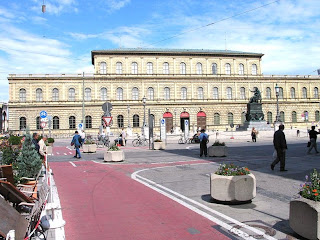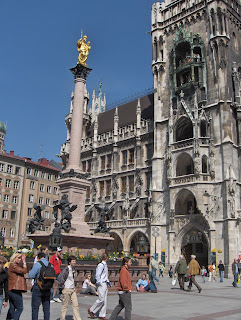Our next overnight stop will be in Munich. It is approximately three hours from Nuremberg. Munich is the capital of the state of Bavaria and lies near the foot of the German Alps. It is located on the River Isar. Munich started out as a small town enclosed by a wall and then expanded beyond it. The 'inner city' occupies a small area that is easy to explore on foot and you'll get a sense of the original wall because the gates still remain.
Munich was founded (1158) by Henry the Lion, Duke of Saxony and of Bavaria. In 1806 the city was made capital of the kingdom of Bavaria. Munich became a cultural and artistic center and it played a leading role in the development of 19th- and 20th-century German painting.
After World War I the city was the scene of considerable political unrest. National Socialism (Nazism) was founded there, and on Nov. 8, 1923, Adolf Hitler failed in his attempted Munich “beer-hall putsch”—a coup aimed at the Bavarian government. Despite this fiasco, Hitler made Munich the headquarters of the Nazi party, which in 1933 took control of the German national government. Munich was badly damaged during World War II, but after 1945 it was extensively rebuilt and many modern buildings were constructed.
The 1972 Olympic Games were held in Munich. The games were blackened by the hostage taking and subsequent killing of eleven members of the Israeli Olympic team.
The traditional Bavarian foods served in Munich include bratwurst and other sausages, fried potatoes or potato salad, sauerkraut, dumplings and roasted meats such as pork or veal. And no trip to Munich would be complete without trying Apfelstrudel for dessert or a giant pretzel fresh from the oven.
Our visit to Munich will probably include a guided city tour by bus as well as a walking tour of the center of the city. Some of our stops on the tour may include:
1. Munich Residenz

2. Marienplatz

3. Frauenkirche - Cathedral Church of Our Lady

4. Hofbrauhaus

5. The Viktualienmarkt

Check out this video on youtube to see more of Munich:http://www.youtube.com/watch?v=gj9cYPeO5eA&feature=relmfu












